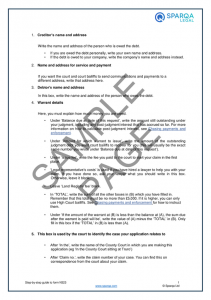 If you have obtained judgment against someone, but they still fail to pay you the amount owed, you can use Form N323 to ask the County Court’s bailiffs to collect the sum on your behalf. This is known as a warrant of control. Our step-by-step guide to Form N323 will help you complete and file the necessary paperwork, to expedite your judgment debt collection. It’s important to get the paperwork right the first time because otherwise your warrant of control could be delayed.
If you have obtained judgment against someone, but they still fail to pay you the amount owed, you can use Form N323 to ask the County Court’s bailiffs to collect the sum on your behalf. This is known as a warrant of control. Our step-by-step guide to Form N323 will help you complete and file the necessary paperwork, to expedite your judgment debt collection. It’s important to get the paperwork right the first time because otherwise your warrant of control could be delayed.
Contents
Asking the court to enforce a judgment debt
Can I ask court bailiffs to help collect a judgment debt for me?
Yes. Once you have obtained a court judgment on the debt, you can ask the court bailiffs (also known as enforcement agents) to collect it for you. This enforcement action should only be taken if you know or believe that your debtor has assets which can cover the value of the debt.
You can ask the court bailiffs to collect a debt you are owed at any time after your debtor has failed to pay up under the terms of the court order and before six years from the date of the judgment. Note that if no payment date is specified, the debtor must pay within 14 clear days of the date of the court order.
Should I ask the County Court or the High Court to help collect an outstanding judgment debt?
If you are owed less than £5,000 you can choose whether to ask the County Court or High Court bailiffs to collect the debt (unless your judgment is for less than £600 in which case you must use the County Court).
As a general rule it is usually cheaper and more straightforward to have the County Court bailiffs attempt to collect judgment debt on your behalf. High Court enforcement is more expensive, but can be more effective, particularly for higher value judgment debts.
This post is focused on applications to the County Court for enforcement of a judgment debt. For further guidance on making such an application to the High Court, see our detailed Q&A guidance on chasing payments and enforcement.
Using County Court bailiffs: completing and filing Form N323
Form N323 is the paperwork used for requesting a 'warrant of control' to ask County Court bailiffs to collect a debt on your behalf. You can do this if you already have a County Court judgment debt for less than £5,000 against another person or business that has not been paid by the deadline specified.
A warrant of control is the paperwork giving County Court bailiffs the power to collect a County Court judgment debt on your behalf. You can use Form N323 to request a warrant of control from the County Court. What is Form N323?
What is a warrant of control?
How do I complete and file Form N323 to appoint County Court court bailiffs?
You do not need a lawyer to do this, it is a form-filling exercise. You need to ask the County Court to give its bailiffs power to collect your debt. The paperwork that gives them this power is known as a warrant of control. To apply:
-
Fill in the application form
If your judgment was issued through the County Court Money Claims Centre, visit their website, login and click on the ‘Warrant’ option on your Claims Overview page to request bailiffs using the simple online form.
If your judgment was issued at a County Court hearing centre, fill in Form N323 . You can use our step-by-step guide to Form N323 to help you complete the necessary paperwork.
-
Send your application to court (unless applying online)
Send three copies of the application and an official copy (eg a court produced copy) of the judgment to the relevant court along with a stamped, self-addressed envelope for your copy to be returned.
-
Pay the fee
You will need to pay a fee of £110 when you file your application by cheque or postal order made out to HM Courts & Tribunals Service (or £77 by debit or credit card if you use Money Claims Online). This fee can be recovered from your debtor along with the money you are owed.
When the so-called ‘warrant of control’ is issued, the County Court bailiffs will try to recover the money you are owed. If you do not hear anything within one month after filing the warrant at court, contact them for an update. Remember that you must immediately notify the court in writing if your debtor pays you back any or all of the debt while the warrant of control is in place.
What can County Court bailiffs do to collect my judgment debt?
County Court bailiffs will give your debtor seven clear days’ notice to pay the debt. If no payment is made, they will have 12 months to seize your debtor’s goods (although you or the bailiff can get this extended for a further 12 months in limited circumstances).
Bailiffs have the power to enter your debtor’s home or workplace, or to stop them on the roads and seize money or goods to sell at auction in order to pay you back the money you are owed. You should bear in mind that there are some restrictions on what goods can be taken (eg they cannot take household items such as clothing or essential white goods, or necessary work equipment (eg tools or computer equipment) that is worth less than £1,350).
Once the goods have been seized, the bailiffs will try to sell them at auction for the best price they reasonably can, and they will use the proceeds to repay your debt, satisfy their own costs, and then return any leftovers from the sale to the debtor.
Alternatives to County Court bailiffs and Form N323
What other options do I have if a judgment debt owed to me is not paid?
Aside from (or in addition to) applying to the County Court to have bailiffs attempt to collect the money you are owed, you might consider taking any of the following alternative enforcement actions. It is recommended that you instruct a lawyer when pursuing the majority of these actions:
- applying to have High Court enforcement agents collect the amount you are owed;
-
if your debtor is an individual who is in employment, applying for an attachment of earnings order to get the money you are owed deducted from their wages;
-
applying to freeze the money you are owed in your debtor’s bank account and getting the bank to pay the money over to you, known as a third party debt order;
-
if your debtor owns property, securing the money you are owed on that property by applying for a charging order; and/or
-
bringing bankruptcy proceedings if your debtor is an individual or winding-up proceedings if your debtor is a company.
If at any point after you have started formal enforcement action your debtor pays you back either in part or in full, you must immediately inform the court in writing.
There are further enforcement actions that your lawyer may advise you to consider which are less common and outside the scope of this service. These include applying for a freezing order, which may be used when there is a risk that your debtor will get rid of their money (eg by moving it offshore or transferring it to another business or individual) to avoid paying you or the appointment of a receiverto preserve assets if there is a dispute over the debt.
Not all enforcement actions will be suitable to your specific case and you should consider carefully whether they will be worthwhile before you incur the time and expense involved in pursuing them. Things that you should bear in mind include whether your debtor owes money to other creditors who might be taking their own action and whether your debtor can actually afford to pay you back (eg what your debtor’s income and outgoings are and what assets or property it owns).
Remember that at any point, you can consider writing off the debt you are owed if you receive information which suggests that enforcement action will be fruitless.
For more detailed guidance on the above enforcement options, and other practical advice to assist in recovering sums your business is owed, see our detailed Q&A on chasing payments and enforcement.
The content in this article is up to date at the date of publishing. The information provided is intended only for information purposes, and is not for the purpose of providing legal advice. Sparqa Legal’s Terms of Use apply.

Harry is General Counsel and Company Secretary of FromCounsel, the specialist corporate legal resource trusted by top global law firms and FTSE 100 companies. Before joining FromCounsel in 2021, Harry was a member of Sparqa’s editorial team for over 4 years, having previously practised as a corporate solicitor for 6 years at Farrer & Co. Harry regularly contributes his expertise to the blog, focusing on corporate and commercial law.






